
|
Call for Applications to the PhD program 2026As a BMS student, you will become part of a diverse and dynamic community of graduate students from around 50 countries worldwide, approximately 30% of whom are women. 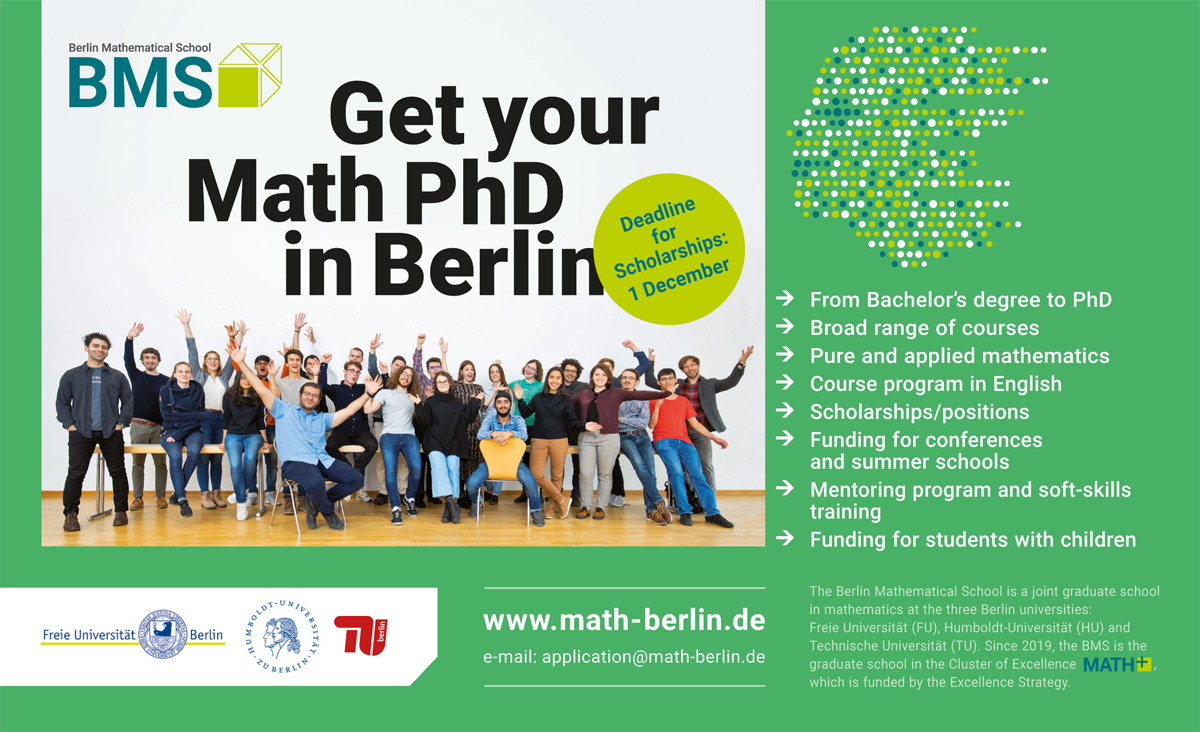 Application Process We are now inviting applications from highly motivated and talented students who are completing or have completed their Bachelor's or Master's degree and wish to pursue a PhD in mathematics. The BMS application process consists of two rounds. For admission to our 2026 program, applications will be accepted via our online application portal. Application Deadlines Phase I (Master's Studies) For students who will have completed a Bachelor's degree by summer 2025 and wish to pursue a PhD through the BMS program starting with Phase I (Master's studies):
For students who will have completed a Master's degree (or equivalent) and wish to enter directly into the doctoral phase of the program:
Srinwanti Debgupta Receives Honorable MentionForveG (Forschungsvereinigung Großhandel e.V.) is dedicated to fostering outstanding early-career researchers and promoting applied research by emerging scholars. In 2025, the organization introduced a new award to encourage research projects that provide significant insights into the understanding and advancement of wholesale trade and its economic functions. 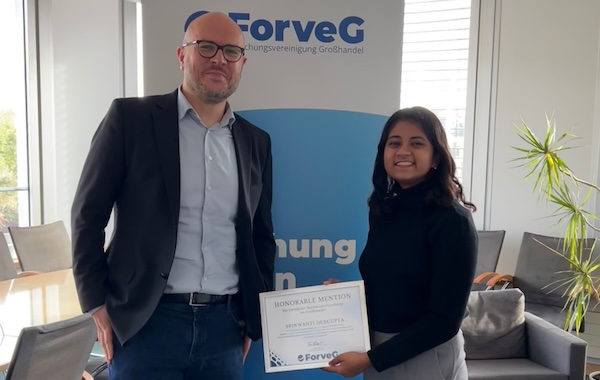 Michael Nitsche, Managing Director of ForveG, and Srinwanti Debgupta
Srinwanti Debgupta completed her Bachelor’s degree in Mathematics at St. Stephen’s College, University of Delhi (India), before earning her Master’s degree in Mathematics from TU Berlin as a BMS Phase I scholarship recipient in 2024. 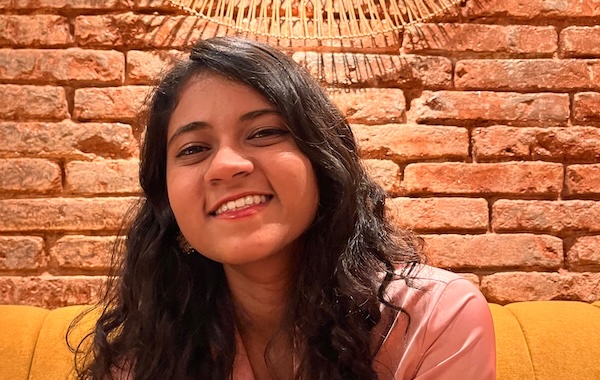 Her Master’s thesis, “Unsplittable Transshipments,” introduces a variant of unsplittable flows that seeks a feasible transshipment where the flow from any source to any sink is routed along at most one path. It generalizes the seminal work of Dinitz, Garg, and Goemans on single-source unsplittable flows and provides a provably minimal congestion guarantee equal to the maximum sink demand. Unsplittable transshipments more faithfully model the realities of wholesale logistics than traditional flow models, making this project particularly valuable for capacity-aware planning in the wholesale logistics sector. Her current doctoral research for the MATH+ project “Unsplittable Flows” (MATH+ Research Area AA3), conducted in collaboration with Prof. Dr. Martin Skutella and Dr. Sarah Morell, extends this work to questions of maximum routable demand and the number of rounds required. Future directions include identifying potential connections to discrepancy theory, developing a bicriteria approximation algorithm for the minimum-cost version, and studying the k-splittable variant of the problem. “It is a privilege to provide such an ambitious early-career researcher with the chance to present her research results,” says Michael Nitsche, Managing Director of ForveG. “We are particularly pleased that Ms. Debgupta has decided to continue her work on wholesale-related topics as part of her PhD at MATH+ The Berlin Mathematics Research Center. As a member of a larger research team, she will continue working on optimizing wholesale logistics. This is precisely the kind of research that will help the wholesale sector sustainably improve its processes and advance technology.” As part of ForveG’s commitment to promoting research in logistics, Srinwanti Debgupta will present her findings and their implications for wholesale in an upcoming webinar. The event is open to all.
BMS Certificate Ceremony & Dissertation AwardsThe afternoon began at 14:00 with a MATH+ Friday Colloquium titled “On optimality conditions for nonsmooth functions” by Andrea Walther, professor of mathematical optimization at Humboldt-Universität zu Berlin, Vice-President of the Zuse Institute Berlin (ZIB), and one of the three MATH+ Chairs since October 2024.  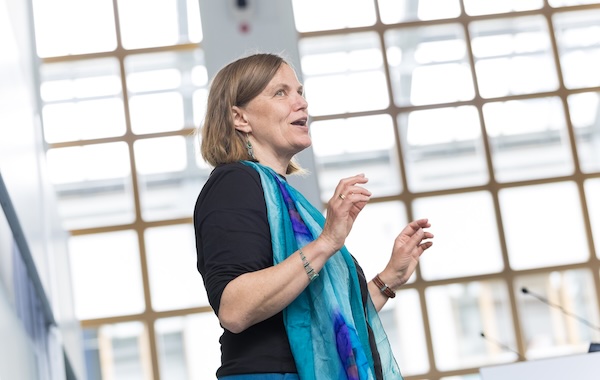 MATH+ Friday Colloquium with a lecture by MATH+ Chair Andrea Walther (HU Berlin/ZIB)  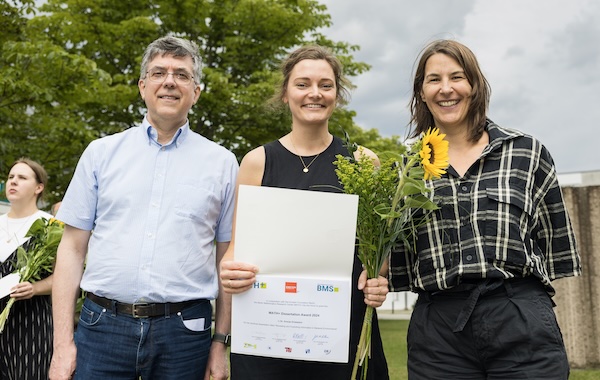 BMS Coordinator Annika Preuß-Vermeulen (left photo), BMS Chair J. M. Sullivan, Dissertation Awardee S. Griesbach, MATH+ Chair C. Schillings MATH+ Chair Claudia Schillings (FU Berlin) then delivered a laudation for the MATH+ Dissertation Award winners of 2024, a prize first established in 2020. In cooperation with the Einstein Foundation Berlin, the BMS awards up to four annual prizes for outstanding dissertations to BMS graduates. This year, the awards went to Fabian Altekrüger, Svenja Griesbach, Federico Moretti, and Luisa Plato for their excellent theses. Congratulations to all of them! You can find more information about the four awardees on the MATH+ website. Svenja Griesbach and Luisa Plato attend the event and proudly received their Dissertation Award certificates. Unfortunately, Federico Moretti and Fabian Altekrüger could not participate in the ceremony, as Federico recently began his postdoctoral position in the USA and Fabian is currently traveling around the world. 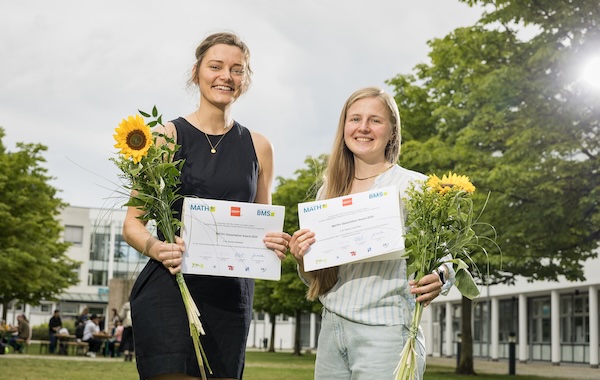 MATH+ Dissertation Awardees Svenja Griesbach (left) and Luisa Plato
Claudia Schillings also honored the three Young African Mathematician (YAM) of the MATH+ YAM Fellowship Program 2024-2025: Sintia Laura Nyaffi Achikwoue and Gill Wilfried Laken Kouatche from Cameroon, and Sergio Germain Tinaharimanjaka from Madagascar. The fellows successfully completed the nine-month program within MATH+. Laura and Wilfried will continue with the BMS PhD program in Berlin this fall. 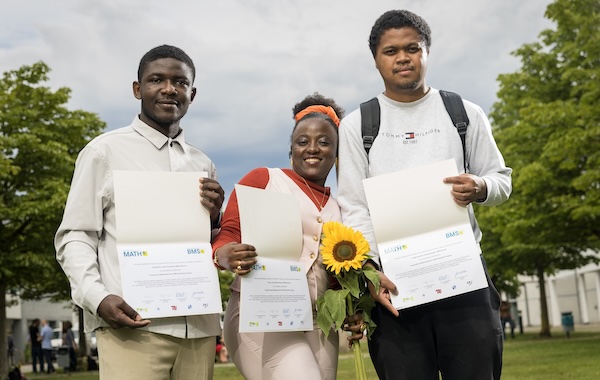 YAM Fellows: Gill Wilfried, Sintia Laura, and Sergio Germain (left to right)
Afterwards, BMS Chair John M. Sullivan announced this year’s Phase I and Phase II graduates. 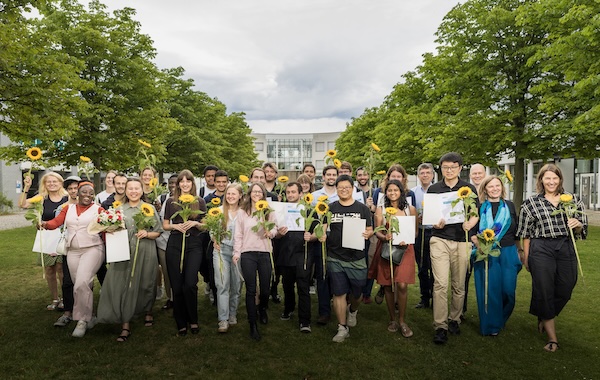 Happy BMS graduates of Phase I and Phase II with Chairs and BMS Office members
Bright sunflowers, presented along with the certificates, brought a sunny touch to an otherwise cloudy day. Photos captured joyful BMS alumni in groups, with supervisors, and with their loved ones.  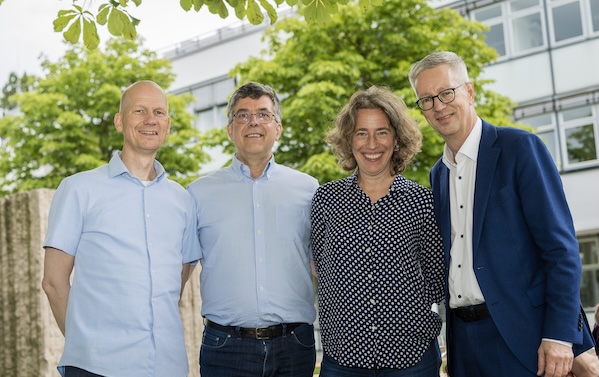 Relaxed get-together of the mathematical community enjoying the barbecue | BMS Chairs Holger Reich and John M. Sullivan with MATH+ Managing Director Nadja Wisniewski and FU Berlin President Günter M. Ziegler The evening closed with a lively barbecue reception and summer party — the perfect opportunity to connect, talk about science, and exchange memories with graduates and the entire MATH+ community. Photos: © Kay Herschelmann / MATH+ In memory of Tobias KreutzTobias completed his PhD in 2022 at Humboldt-Universität zu Berlin under the supervision of Bruno Klingler and Laurent Fargues. Since then, he had been a postdoctoral visitor at the Max Planck Institute for Mathematics. His research focused on the interface between complex and p-adic Hodge theory, particularly on transcendental periods. In his final work, he introduced obstructions to complex Hodge structures being of geometric origin. Tobias was a valued and respected member of the mathematical community and BMS. He will be greatly missed. - Margarita Kostré  BMS Days & Student Conference | February 2025The BMS Days 2025 took place on 17 and 18 February at Urania Berlin, bringing together invited BMS applicants from around the world. We were delighted to welcome 28 outstanding Phase I applicants from 15 different countries, each invited to experience a full week in Berlin. The event kicked off on Sunday morning with a welcome session, organized by the BMS Student Representatives. 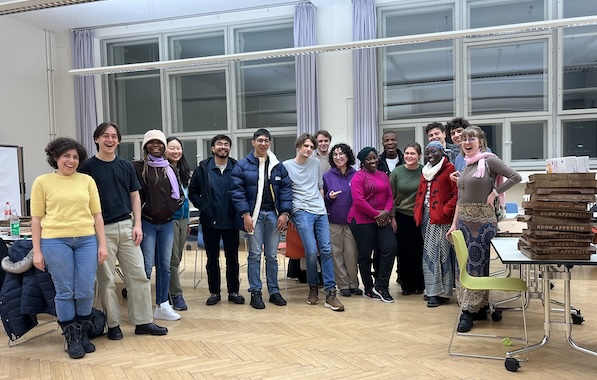 Pizza Night / © Georgi Mitsov
Throughout the week, applicants were introduced to the BMS graduate program, met potential supervisors, and gained insight into life as a graduate student in Berlin. The BMS Days not only allowed the Admissions Committee to conduct in-person interviews but also gave applicants a glimpse into the academic opportunities at BMS. Applicants also had the chance to connect with current BMS students and faculty members. As always, the program included an overview of the BMS graduate program, Q&A sessions, and mathematical talks delivered by MATH+ faculty members. For those unable to travel to Berlin, an online info session was held on 13 February, providing applicants with the opportunity to ask questions about BMS and studying in Berlin. 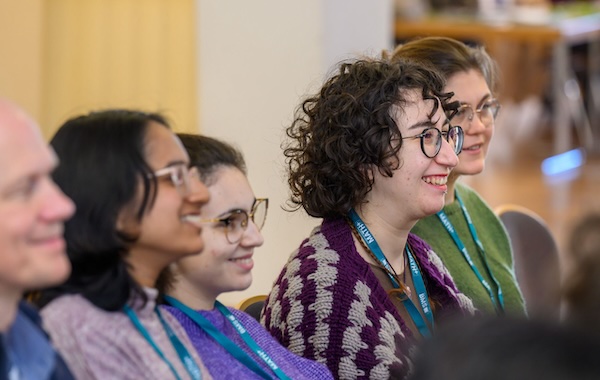 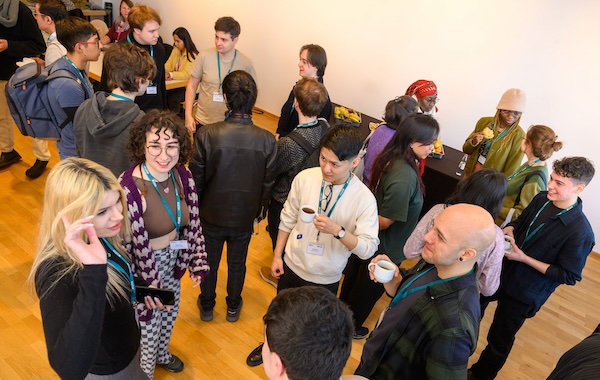 Applicants at BMS Days / © David Ausserhofer
The mathematical lectures were given by Falk Hante (HU Berlin), Anna Maria Hartkopf (FU Berlin), Marc Kegel (HU Berlin), Alexandra Wesolek (TU Berlin), Hanno Gottschalk (TU Berlin), and Max von Kleist (FU Berlin). 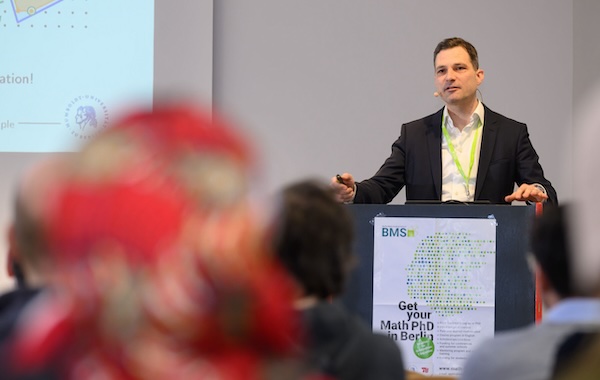 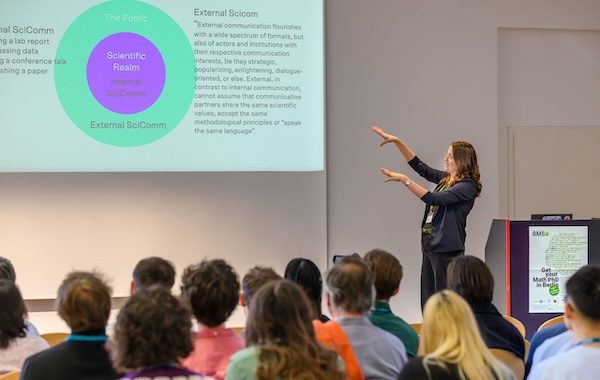 Falk Hante / © David Ausserhofer Anna Maria Hartkopf / © David Ausserhofer BMS Student Conference | 19–21 February 2025 Following the BMS Days, the BMS Student Conference took place from 19 to 21 February at TU Berlin. The conference featured invited speakers Claudia Totzeck (U Wuppertal) and Marita Thomas (FU Berlin), as well as several BMS students who presented their research. Attendees enjoyed a diverse program showcasing the breadth of Berlin’s mathematical landscape, with BMS students delivering talks on various topics and sharing their research projects. 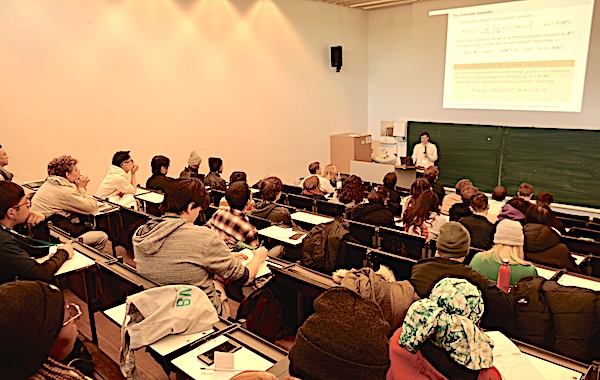 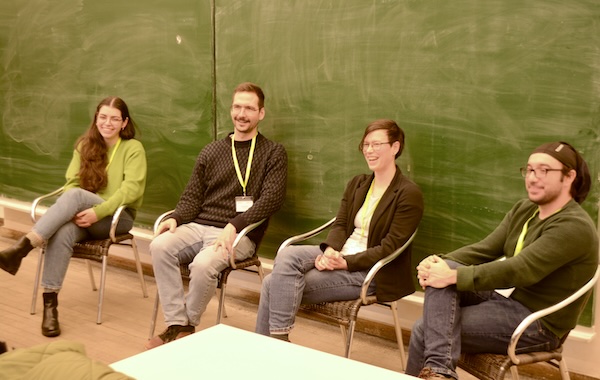 BMS Student Conference / © Apratim Choudhury The highlight of the week, as always, was the traditional “Wine & Cheese” on 20 February bringing everyone together in a relaxed atmosphere. To wrap up the event with a special occasion, BMS Alumni were invited to speak about career opportunities after Phase I or Phase II of the BMS program on 21 February. Overall, the BMS Days and Student Conference were a great success, offering both formal and informal opportunities for networking and engagement. We hope to welcome many of our guests back in the fall as they begin their BMS careers! BMS Alumna Honored for Outstanding DissertationThe ceremonial event, held in the Henry Ford Building, marked the university’s 76th anniversary and featured the presentation of the “Ernst Reuter Prize.” Since its establishment in 1985, the award has been sponsored by the Ernst-Reuter-Gesellschaft (ERG) to honor outstanding doctoral dissertations from young researchers at Freie Universität. Each year, up to four dissertations are recognized—ideally one per subject group—with recipients selected through a competitive process. Eligible dissertations must be graded “summa cum laude”, and each prize includes a €10,000 award. The fourth subject group encompasses fields such as Mathematics and Computer Science, Physics, Biology, Chemistry, Pharmacy, and Geosciences. Helena Kremp earned her bachelor’s and master’s degrees at Humboldt-Universität zu Berlin before joining Freie Universität as a BMS PhD student under the supervision of Nicolas Perkowski. She contributed to the MATH+ project group “Stochastic Analysis of Particle Systems: Langevin Dynamics and the Dean-Kawasaki Model” in the Life Sciences application area. Kremp completed her PhD in April 2023 with her award-winning dissertation, “Topics in Particle Systems and Singular SDEs.” Following her doctorate, she began a postdoctoral position at TU Vienna and, as of December 2024, has returned to Berlin. She now works as a PostDoc within the CRC/TRR388 project “Rough Analysis, Stochastic Dynamics, and Related Fields” at both TU Berlin and the Weierstrass Institute for Applied Analysis and Stochastics (WIAS). The laudatory speech for Helena Kremp was delivered by Hermann Kreutzmann, chairman of the Ernst Reuter Prize selection committee. Portrait videos of the four awardees from different subject groups were presented during the ceremony, followed by a keynote lecture by Jutta Allmendinger, former president of the Social Science Research Center (WZB). Other prominent attendees included Günter M. Ziegler, president of Freie Universität Berlin, and Matthias Dannenberg, chairman of the Ernst-Reuter-Gesellschaft. 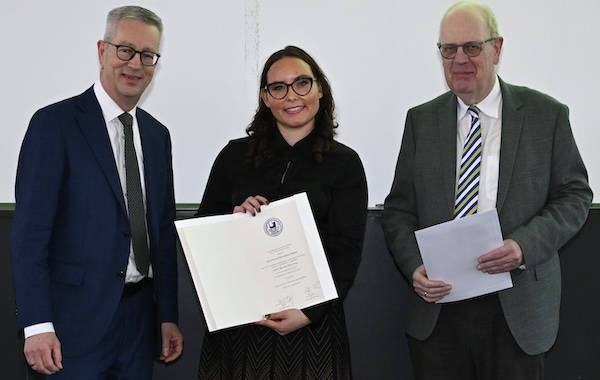 Günter M. Ziegler (President of Freie Universität Berlin), Helena Kremp,
Matthias Dannenberg (Chairman of Ernst Reuter Gesellschaft / ERG), fltr, © Freie Universität Berlin / Christoph Assmann Reflecting on the honor, Kremp shared: “It is a great honor for me to be awarded with such an important prize, which has been granted every year since 1985 on Freie Universität’s foundation day. The award ceremony was also a special experience, as I had the opportunity to meet the three other award winners from different subject groups and learn about their remarkable research. I feel deeply grateful for the unwavering support from my supervisor Nicolas, my family, and my friends, who made it possible for me to focus entirely on my PhD research.” Her supervisor Nicolas Perkowski praised her work: “Helena’s thesis is an impressive contribution to the field of stochastic and rough analysis. Throughout her doctoral studies, I was struck by her technical strength, breadth, productivity and deep understanding of complex methods. She established several results that I had previously struggled to prove. Her contributions to singular diffusions and to interacting particle systems is already shaping and inspiring new research. I am incredibly proud to see her recognized with the Ernst-Reuter Prize and look forward to her future contributions to mathematics.“ 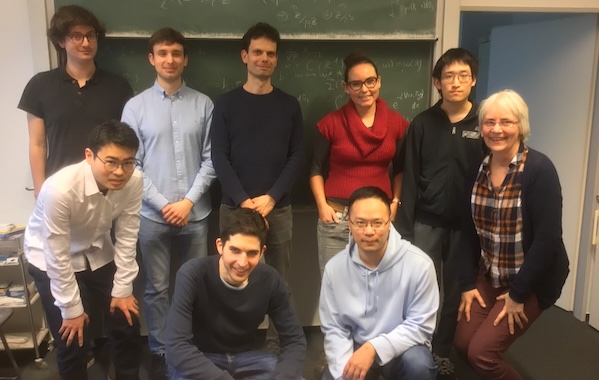 Nicolas Perkowski’s research group: Immanuel Zachhuber, Lukas Gräfner,
Nicolas Perkowski, Helena Kremp, Wei Huang, Silvia Hoemke (fltr/rear row) and Toyomu Matsuda, Henri Elad Altman, Huanyu Yang (fltr/front row) BMS mourns Hannah Rohwer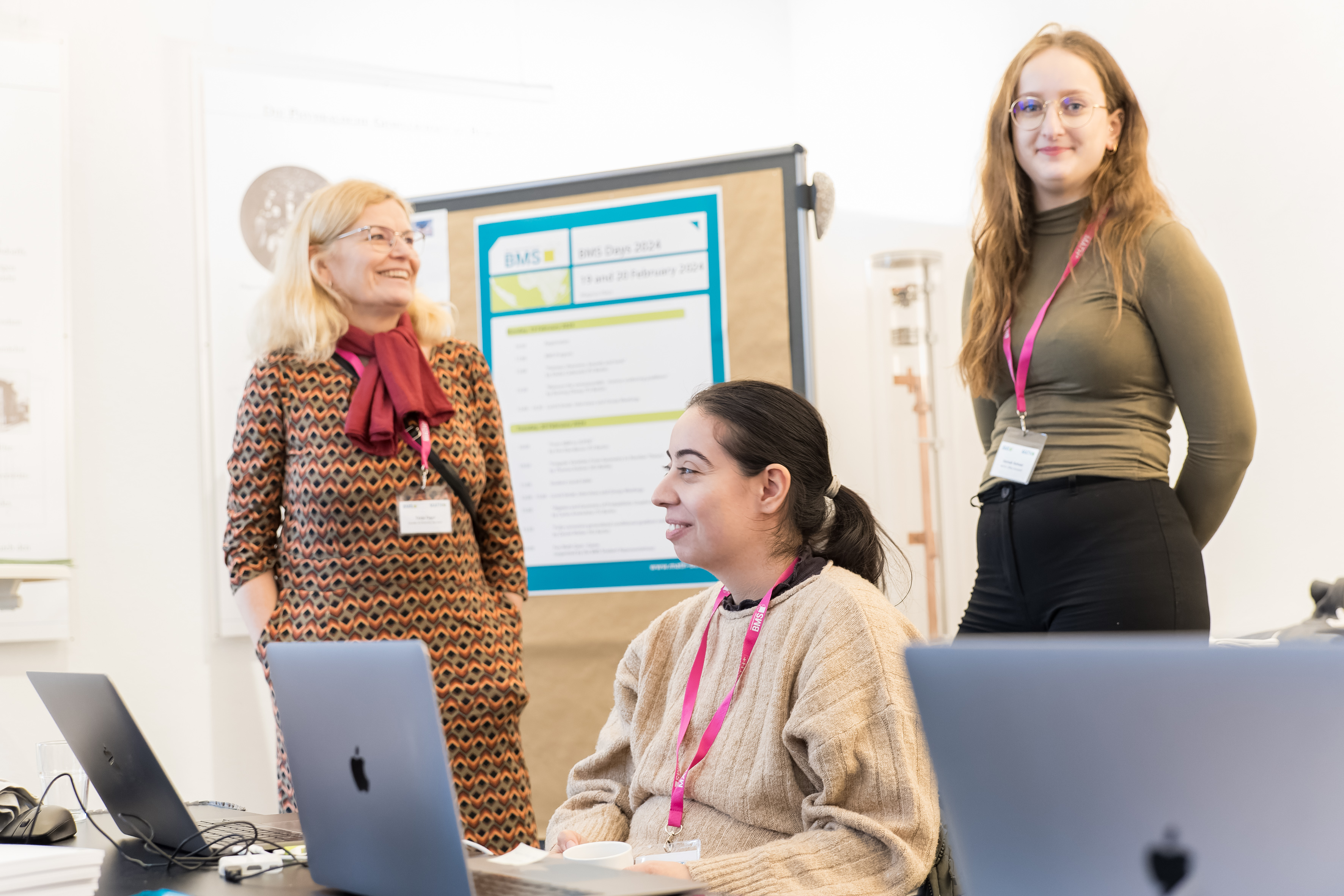 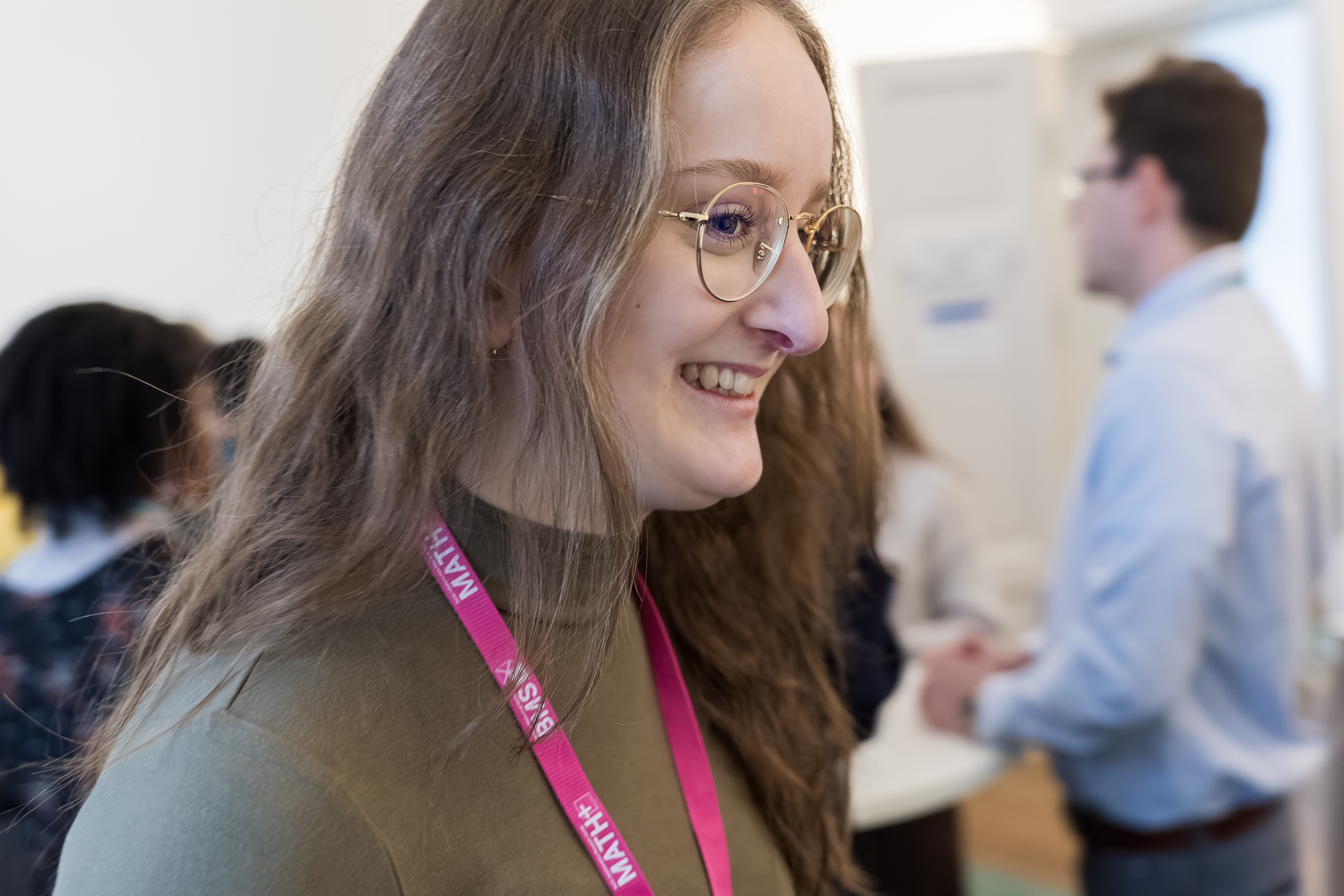 BMS Alumna Received “Marthe Vogt Award”On 7 November 2024, the "Marthe Vogt Award" was conferred during a festive ceremony at the Leibniz Headquarters in Berlin on Dr. Alexandra Quitmann and Dr. Sara Hetzel. Alexandra Quitmann completed her bachelor’s and master’s studies at the Universität Münster before moving to Berlin to pursue her research as a BMS student at the Weierstrass Institute for Applied Analysis and Stochastics (WIAS) under the supervision of Wolfgang König. She was also part of the International Research Training Group Berlin-Oxford (IRTG) 2544 “Stochastic Analysis in Interaction” and earned her PhD from the Technische Universität Berlin in October 2023 with the award-winning thesis on “Phase Transitions in Random Loop Models.” The laudatory speech in her honor was given by Michael Hintermüller, Director of WIAS, professor at Humboldt Universität zu Berlin, and former MATH+ Chair. Stefan Eisebitt, spokesperson of the Executive Board of Forschungsverbund Berlin, welcomed the attendees, while Micha Klapp, State Secretary for Labor and Equality, served as the keynote speaker. 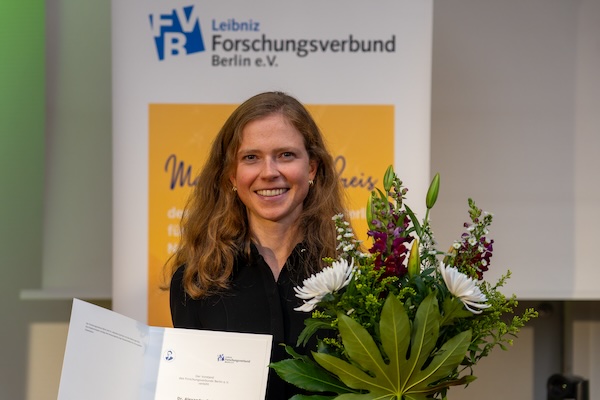 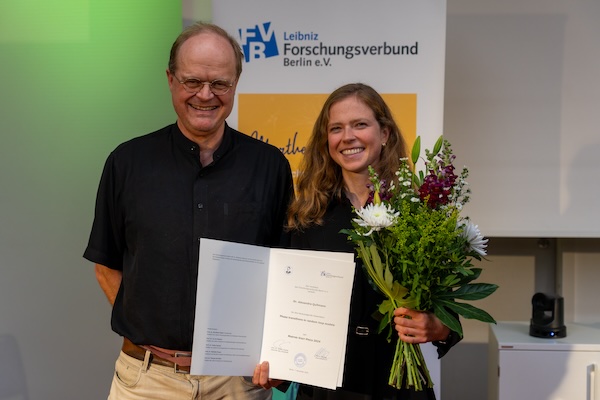 Photos: Alexandra Quitmann and Wolfgang König | © Mario Firyn / FVB
Wolfgang König, her supervisor at WIAS, praised her work: “Throughout Alexandra Quitmann’s doctoral studies, it was a pleasure to witness her deep commitment to the topic and her relentless determination. She never gave up, constantly pushing forward until she succeeded. This remarkable perseverance has now been justly rewarded. I believe she has solved an extraordinary problem. Starting this project amidst the pandemic required a high degree of independence and discipline, which she mastered exceptionally well; I find that truly impressive.” — The Marthe Vogt Award is conferred annually on an outstanding young female scientist for her excellent thesis in a field represented by the institutes of the Forschungsverbund Berlin (FVB). Notably, the research need not have been conducted at an FVB institute. The research fields covered include, but are not limited to, Molecular Pharmacology, Structural Biology and Chemical Biology, Advanced Materials, Aquatic Ecology and Biodiversity Research, Biology, Veterinary Medicine and Environmental Research, Nanomaterials, Quantum Materials, Optoelectronics and Materials Science, Laser Research and Light-Matter Interaction, as well as Applied Mathematics. The doctoral dissertation must have been completed at a non-university research facility or a university in the Berlin and Brandenburg region. Marthe Vogt (1903–2003) conducted pioneer research on neurotransmitters and worked at the Kaiser-Wilhelm-Institut für Hirnforschung in Berlin-Buch, now location of the Leibniz-Forschungsinstitut für Molekulare Pharmakologie (FMP). She is an academic and personal role model for this award. Due to national policies against Jewish scientists, she left Germany in 1935 and continued her research in Great Britain. MATH+ Welcomes New Cohort of YAM Fellows 2024/25The fellows have just arrived and were excited to participate in the BMS Orientation Week (7-11 October). They will remain in Berlin until the summer of 2025. As YAM fellows, they are also part of the Berlin Mathematical School (BMS) through the Young African Mathematicians (YAM) Fellowship Program. In an interview with MATH+, they shared their thoughts on the YAM Fellowship, their study plans in Berlin, and their aspirations, which are summarized in their direct comments below. 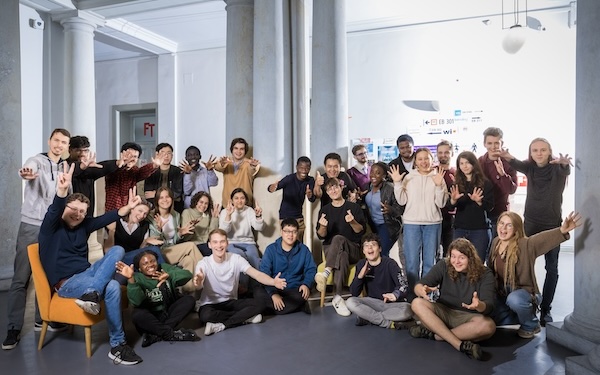 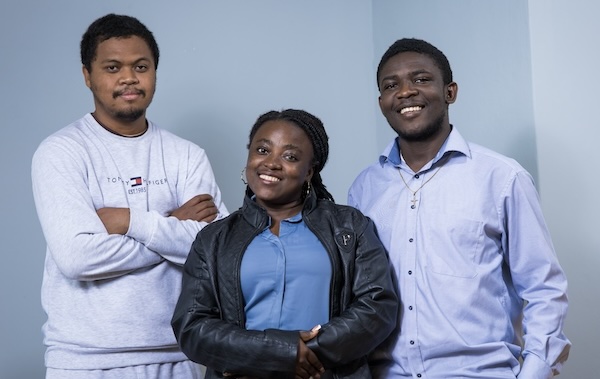 BMS Orientation Week, Day 1 (all participants) YAM Fellows 2024/25 (Sergio, Sintia, Gil Wilfried: left to right) Supervisor: Angela Ortega, Humboldt Universität zu Berlin Sintia Laura, a mathematician from Cameroon, has a passion for pure mathematics. After completing her Master’s in pure mathematics at the University of Douala, focusing on algebraic coding theory, she has broadened her expertise to include Riemannian geometry, algebraic curves, and cryptography. She is currently pursuing a Master’s degree at the African Institute for Mathematical Sciences (AIMS) in Limbe, Cameroon, exploring sub-Riemannian geometry. Sintia aims to deepen her knowledge in abstract algebra, with a focus on commutative algebra and functors. She is working on groundbreaking topics, eager to develop new insights in both theory and applications. At MATH+, Sintia looks forward to enhance her independent research skills while collaborating across disciplines. Sharing her thoughts on her future, she remarked: “Receiving the admission letter wasn’t just about getting in or a one-year scholarship – it felt like the start of a new chapter in my life. I was thrilled! When my Berlin supervisor introduced me to algebraic geometry with such passion, I immediately became interested. My goal is to master computational algebra and then delve into algebraic geometry. I want to make an impact in science, especially for women mathematicians. After the YAM program, I plan to pursue a PhD and eventually become a professor, inspiring girls to pursue STEM careers. I dream of doing my PhD in Germany, to further explore the culture and language.“
Gil Wilfried Lakena Kouatche (Cameroon) – From Mathematics to Health Statistics Supervisor: Tim Conrad, Zuse Institute Berlin (ZIB) Gil Wilfried is another mathematician from Cameroon, with a strong foundation in pure mathematics and data science. After earning his Bachelor’s degree and completing Master’s coursework at the University of Douala, he transitioned to the African Institute for Mathematical Sciences (AIMS) in Cameroon to focus on data science. His current studies cover advanced topics such as statistical inference, Bayesian statistics, and machine learning, with a focus on analyzing randomized controlled trials (RCTs). Gil Wilfried aspires to become an expert in health statistics, a critical field for understanding healthcare interventions. At MATH+, he hopes to deepen his applied statistics knowledge and pursue a PhD, making impactful contributions to the field of health data analytics. He reflected: “Germany is one of the best countries for studying, especially in mathematics. Through the YAM program, I’ll meet mathematicians from diverse backgrounds, and my supervisor specializes in the field I want to pursue. I was thrilled to receive the fellowship, as I’ve been looking for a way to continue my studies and experience the difference between studying in Germany, Cameroon, and at AIMS. I aim to combine what I have learned in my research in Africa, which is pure mathematics and data science. I’m particularly interested in geometry, data analysis, and simulations that connect mathematics with real-world applications. After the YAM fellowship, I plan to pursue a PhD and contribute to solving problems in Africa, especially through data analysis.”
Sergio Germain (Madagascar) – Innovating with Data Science for Global Challenges Supervisor: Ralf Borndörfer, Zuse Institute Berlin (ZIB) Sergio Germain, a data scientist from Madagascar, is currently studying at AIMS Rwanda. His journey in education has been shaped by resilience, overcoming disruptions in Madagascar’s education system due to frequent teacher strikes, which led him to become largely self-taught. Despite these challenges, Sergio excelled academically, focusing on addressing real-world problems. His Master’s thesis involves designing a cost-effective seawater desalination system to combat water scarcity in Madagascar. At MATH+, Sergio aims to strengthen his skills applied mathematics, data analysis, and machine learning. His current project on biometric identification using deep learning for security enhancement aligns with his broader goal of using technology to address global challenges. Thinking about his time in Berlin, he remarked: “I was excited to apply for the YAM fellowship and I was proud to be selected, knowing how competitive the program is. Arriving in Berlin, others who came earlier helped me adjust to the weather, transport, and local customs. My supervisor specializes in optimization and discrete mathematics, while my background is in data science which is a great chance for me. I enjoy programming and am particularly interested in flight scheduling and optimization. So, my project will combine machine learning with discrete mathematics. I plan to pursue a PhD in Germany and build a career in aviation and flight planning, depending on what comes after the YAM program.”
About the YAM Fellowship Program: The Young African Mathematicians (YAM) Fellowship Program is a collaboration between five of the African Institutes for Mathematical Science (AIMS) and four German Clusters of Excellence: Hausdorff Center for Mathematics (Universität Bonn), Münster Mathematics (Universität Münster), STRUCTURES (Universität Heidelberg), and MATH+ (Berlin). The YAM program welcomes talented African students in mathematics to join one of the four clusters for nine months. They can take courses and seminars and gain experience in working on research projects. Photos: © Kay Herschelmann / MATH+ CfA: BMS Dirichlet Postdoctoral FellowshipsThe Dirichlet Postdoctoral Program is open to early-stage postdoctoral researchers from around the world across all mathematical fields. MATH+ and the BMS will support their development into independent researchers, while helping them to further qualify themselves for their future careers and gain international visibility. The Dirichlet Postdoctoral Fellows have the freedom to carry out their own ambitious research agendas and follow their own research interests. In Berlin’s the rich mathematical environment, fellows are exposed to the latest developments in their fields of expertise, have the chance to build collaborative networks with national and international scientific contacts, and receive input from other research groups in related or different areas. The BMS and MATH+ offer a stimulating environment and the means for postdocs to collaborate with researchers both within and beyond MATH+. In addition, the postdoctoral researchers will have numerous opportunities to gain teaching, supervisory, and mentoring experience within the BMS framework – with the opportunity to obtain help, feedback, or advice, either individually from BMS Faculty mentors, in BMS complementary skills workshops and courses, or through events offered by the universities. You can submit your applications here. |




















